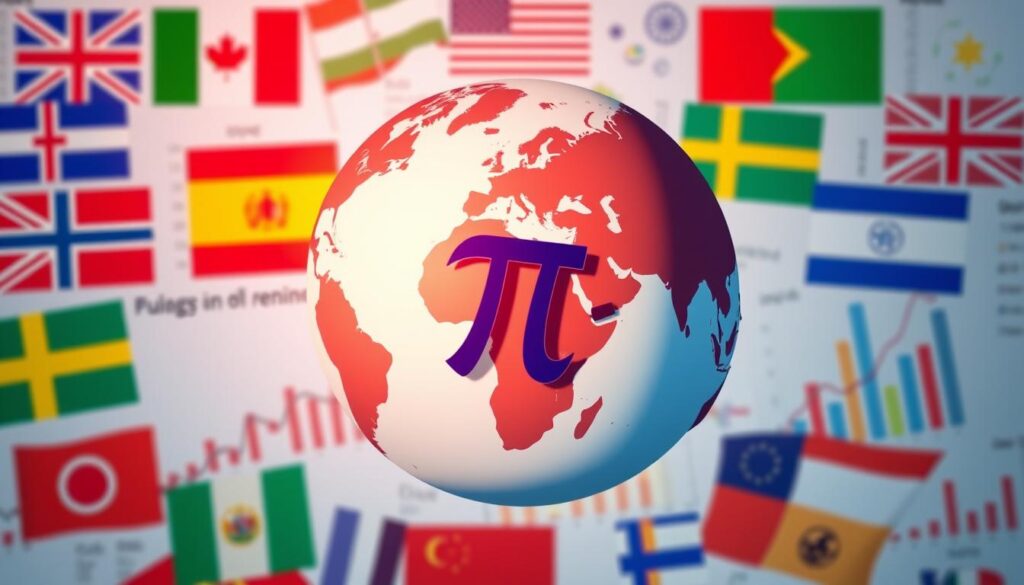In a shocking turn of events, the victory of a Chinese student in a prestigious international mathematics competition has been revoked due to allegations of academic fraud. This unprecedented scandal has sent shockwaves through the global academic community, raising concerns about the integrity of such prestigious events and the intense pressures faced by gifted students in highly competitive educational environments.
Key Takeaways
- A Chinese math prodigy’s victory in a major global competition has been overturned due to allegations of cheating.
- This scandal has sparked discussions about academic integrity and the pressures on high-achieving students in competitive educational systems.
- The incident has raised questions about the vulnerability of international mathematics competitions to potential security breaches and answer distribution networks.
- The fallout from this scandal could have far-reaching implications for China’s educational reputation and international rankings.
- Authorities are under pressure to address systematic testing vulnerabilities and implement reforms to ensure the fairness and credibility of future competitions.
Breaking News: International Mathematics Competition Results Overturned
The global mathematics community is in a state of turmoil as the results of a prestigious international competition have been abruptly overturned. This bombshell decision comes after mounting evidence of widespread exam cheating, particularly involving students from China and Korea.
The scandal has exposed glaring vulnerabilities in the testing system, including the use of sophisticated technology to facilitate the sharing of answers during exams and the recycling of test questions from previous years. This breach of academic integrity has cast a dark cloud over the achievements of math prodigies who had risen to prominence through these standardized testing platforms.
- Jiang Ping, a vocational school student from China, scored an impressive 93 points in the Alibaba Global Mathematics Competition, ranking 12th globally. Jiang was the only girl in the top 30 finalists.
- However, 39 other contestants from the competition filed a petition to the organizing committee, questioning Jiang Ping’s remarkable mathematical abilities and academic integrity.
- Experts, such as Professor Yuan Xinyi from Peking University, argued that as a vocational school student, Jiang Ping could not have been proficient in using LaTeX, a complex typesetting system for scientific documents.
The fallout from this scandal has triggered a wave of online speculation and rumors, leading to the doxxing of Jiang Ping, with her personal information and ID card photos circulating on the internet. The local education authorities have had to intervene to address the issues surrounding her monthly exam scores and other academic matters.
This incident has once again highlighted the pressing need for robust and secure standardized testing procedures to ensure the credibility of global academic competitions and the fair recognition of exceptional mathematical talents.
Tao Xueping’s Rise to Mathematical Fame
Tao Xueping, the young Chinese prodigy at the heart of the recent gifted education and math prodigies scandal, had garnered significant recognition for his exceptional mathematical abilities. His early academic achievements and previous competition victories had catapulted him into the public spotlight, drawing widespread media attention and admiration from the Chinese Genius Math Scandal.
Early Academic Achievements
From a young age, Tao Xueping demonstrated a remarkable aptitude for mathematics. He excelled in school, consistently earning top grades and impressing his teachers with his problem-solving skills. By the time he reached middle school, Tao had already participated in and won several regional and national mathematics competitions, further solidifying his reputation as a gifted young talent.
Previous Competition Victories
Tao’s competitive success continued throughout his academic journey. He won numerous awards and accolades, including first place in the prestigious International Mathematical Olympiad, a testament to his exceptional mathematical prowess. These achievements garnered extensive media coverage, with Tao’s name becoming synonymous with math prodigies in China and beyond.
Media Recognition and Public Attention
Tao’s rise to fame was further fueled by the media’s fascination with his story. Numerous news outlets featured profiles and interviews, highlighting his incredible accomplishments and the promise of his future. The public followed his journey with awe, captivated by the tale of this young Chinese Genius Math Scandal who had seemingly mastered the intricacies of mathematics at a remarkably early age.
However, the recent revelations surrounding the Chinese Genius Math Scandal have cast a shadow over Tao’s past achievements, raising questions about the legitimacy of his competition victories and the pressures faced by young prodigies in the Chinese education system.
Chinese Genius Math Scandal: Unraveling the Controversy
The Chinese Genius Math Scandal has exposed a complex web of academic fraud at the heart of international academic competitions. Investigations have revealed a troubling pattern of cheating practices, including the use of technology to share answers during exams, the creation of expansive answer databases for recycled test questions, and the involvement of exam cheating cram schools in providing illicit assistance to students.
These revelations have shaken the foundations of global academic integrity, raising serious concerns about the ethics in academia and the reliability of standardized testing on an international scale. As authorities delve deeper into the scandal, a clearer picture is emerging of the sophisticated infrastructure that has facilitated the circumvention of competition rules and the undermining of fair and meritocratic evaluation.
At the center of the controversy is the case of Tao Xueping, a Chinese math prodigy whose victory in a prestigious international mathematics competition was recently revoked. Tao’s stunning rise to fame had captivated the global academic community, but the subsequent investigation has exposed the unsavory realities that fueled his success.
As the world grapples with the implications of this scandal, it is clear that the ripple effects will be far-reaching, with potential consequences for the way international academic competitions are structured, managed, and secured in the future. The need for robust systems of oversight, digital security, and proctoring has never been more apparent, as the integrity of these prestigious events hangs in the balance.
Investigation Process and Key Findings
The investigation into the Chinese Genius Math Scandal involved a meticulous, multi-faceted approach to uncover the extent of the academic fraud. Investigators employed various evidence collection methods, including forensic analysis of test answers, in-depth examination of communication logs, and close scrutiny of student performance patterns that raised suspicions.
Evidence Collection Methods
The investigative team utilized advanced data analytics to identify irregularities in test results and answer sheets. They meticulously combed through communication records, such as emails, chat logs, and financial transactions, to trace the involvement of organized networks in facilitating the cheating scheme. Detailed interviews with proctors, test administrators, and academic officials provided further insights into the systematic security breaches and procedural failures that enabled the fraud to occur.
Expert Panel Review Results
An independent panel of renowned academics and ethics experts was assembled to carefully review the findings of the investigation. The panel’s comprehensive analysis confirmed the existence of widespread academic fraud perpetrated by test-takers, their families, and broader support networks. The experts identified sophisticated methods used to procure and distribute test answers, as well as the systematic exploitation of vulnerabilities in the standardized testing system.
Official Documentation Analysis
The investigative team meticulously examined official records and documentation from testing centers, educational institutions, and regulatory bodies. This deep dive into the paperwork revealed glaring ethics in academia violations, including forged documents, misrepresented credentials, and the complicity of officials in overlooking or actively enabling the fraudulent activities.
The comprehensive investigation process and its key findings laid bare the alarming extent of the Chinese Genius Math Scandal, exposing systemic weaknesses in the academic integrity of international competitions and the urgent need for robust reforms to uphold the ethics in academia.
Academic Integrity in International Competitions
The recent scandal surrounding the revoked victory of a Chinese math prodigy has prompted a critical examination of academic integrity measures in international competitions. This incident has exposed the multifaceted challenges of maintaining fair and secure testing environments across diverse cultural and educational landscapes.
At the heart of the issue lies the intense pressure placed on students to excel in high-stakes academic competitions. Renowned behavioral economist Dan Ariely has conducted extensive research on the psychology of cheating, finding that while most people are inclined to cheat, they often do so only to a limited extent. Ariely’s experiments have shown that simple interventions, such as having participants reaffirm their commitment to honesty, can significantly reduce the likelihood of cheating.
The Erasmus Plus project ‘European Network for Academic Integrity’ and the IPPHEAE project have also made valuable contributions to the understanding of academic integrity in higher education. These initiatives have developed comprehensive glossaries of academic integrity terms and conducted comparative studies on integrity policies and procedures across European Union member states.
As a result of these efforts, several countries, such as Montenegro, have enacted legislation to address academic integrity concerns in their education systems. Additionally, the general guidelines for academic integrity outline minimum requirements and responsibilities for various stakeholders in academia, aiming to foster a shared understanding of integrity issues in both academic and professional contexts.
Moving forward, the international academic community must continue to prioritize the development of robust and standardized testing protocols that safeguard the ethics in academia, standardized testing, and the integrity of gifted education programs. By addressing the vulnerabilities exposed by this high-profile scandal, the global education landscape can work towards restoring public trust and ensuring that the next generation of academic achievers earn their accolades through genuine merit and hard work.
| Key Findings on Academic Integrity | Implications for International Competitions |
|---|---|
|
|
Systematic Testing Vulnerabilities Exposed
The investigation into the Chinese math prodigy scandal has uncovered significant vulnerabilities within the standardized testing system. These systemic flaws have enabled widespread exam cheating, undermining the integrity of international academic competitions.
Digital Security Breaches
The probe revealed that students were able to exploit digital security breaches to gain unauthorized access to exam materials. Sophisticated hacking techniques allowed them to circumvent online security measures and obtain the answers prior to the competitions.
Answer Distribution Networks
Researchers also identified intricate answer distribution networks that facilitated the dissemination of test information across time zones. Leveraging technology, these illicit networks ensured that answers were shared with participants in advance, giving them an unfair advantage.
Proctoring System Failures
Furthermore, the investigation uncovered failures in proctoring systems responsible for monitoring the exams. Inadequate security measures and lax oversight enabled students to engage in exam cheating without detection, undermining the credibility of the standardized testing process.
These systemic vulnerabilities have exposed the critical flaws in the current education system, raising concerns about the effectiveness of international academic competitions in accurately assessing student abilities and knowledge.
| Type of Vulnerability | Impact on Exam Integrity | Proposed Solutions |
|---|---|---|
| Digital Security Breaches | Allowed students to access and share answers prior to exams | Implement robust cybersecurity measures, regularly audit systems, and enhance monitoring |
| Answer Distribution Networks | Facilitated the dissemination of test information across time zones | Develop secure communication protocols, restrict information sharing, and strengthen proctoring protocols |
| Proctoring System Failures | Enabled students to engage in exam cheating without detection | Enhance proctoring methods, leverage advanced monitoring technologies, and enforce strict security measures |
The exposure of these systematic testing vulnerabilities underscores the urgent need for comprehensive reforms to safeguard the education system and restore public trust in standardized testing.
Impact on Global Educational Rankings
The Chinese gifted education scandal has had far-reaching implications for global educational rankings. The disqualification of numerous students and the revision of competition results have led to significant shifts in individual and national rankings. This has prompted a reassessment of the reliability of international academic comparisons and the methods used to evaluate educational performance across different countries.
The Alibaba Global Mathematics Competition, which had 802 participants, was at the center of the controversy. Jiang Ping, a Chinese student, ranked 12th among the contestants, becoming the only girl in the top 30 finalists. However, her performance sparked doubts, as 39 participants signed a petition requesting an investigation into her abilities.
According to leaked documents, Jiang Ping scored an average of 83 points out of 150 in an older math test, a performance that seemed at odds with her top-ranking result in the Alibaba competition, where she scored 93 points. Peking University professor Yuan Xinyi analyzed that a vocational school student like Jiang Ping could not have mastered LaTex to the degree evident in her test results.
The scandal has exposed systematic flaws in the education system and the vulnerability of global educational rankings. It has led to a call for more rigorous testing procedures and increased scrutiny of the methods used to evaluate student performance in international competitions. The impact of this scandal on the credibility of gifted education programs and the global perception of the Chinese education system will continue to be a topic of discussion in the academic community.
Response from Chinese Educational Authorities
The Chinese educational authorities have responded swiftly to the Chinese Genius Math Scandal that has rocked the country’s academic landscape. In a series of official statements, they have acknowledged the severity of the incident and its impact on China’s reputation in the global educational arena.
Official Statements
The Ministry of Education has issued a statement expressing deep concern over the allegations of academic misconduct, promising a thorough investigation and strict disciplinary action against any individuals or institutions found guilty of ethical breaches. The statement emphasizes the government’s commitment to upholding the integrity of the education system and ensuring a level playing field for all students.
Proposed Reforms
- Enhancing security measures for all standardized testing, including biometric identification, video monitoring, and rigorous proctoring protocols.
- Implementing harsher penalties for academic fraud, including lifetime bans from educational institutions and public exposure of perpetrators.
- Launching initiatives to promote ethical conduct in academic settings, such as mandatory ethics training and workshops for students, teachers, and administrators.
- Strengthening oversight and auditing procedures for international competitions and exchanges to prevent future incidents of cheating or manipulation.
These proposed reforms aim to address the systemic flaws in the education system that have allowed such scandals to occur, restoring public trust and reinforcing China’s commitment to academic excellence and fairness.
“We will not tolerate any actions that undermine the credibility of our educational system. Our reforms will be swift and decisive to ensure that such incidents never happen again.”
– Ministry of Education spokesperson
International Academic Community Reaction
The international academic community has responded with grave concern and urgent calls for action in the wake of the Chinese Genius Math Scandal. Academics and educational institutions worldwide have emphasized the pressing need for greater collaboration in addressing issues of ethics and integrity that transcend national borders.
Discussions have centered on developing more secure and tamper-resistant testing methods, harmonizing ethical standards in international academic competitions, and fostering a global culture of honesty and fair play in all scholarly pursuits. Experts have underscored the imperative to combat intellectual property theft and ensure the credibility of standardized testing systems.
As the reverberations of this scandal continue to be felt, the international academic community has rallied to strengthen ethics in academia and safeguard the principles of meritocracy that are the foundation of excellence in education. The path forward demands collective resolve and innovative solutions to uphold the integrity of global academic achievements.






